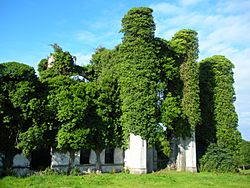Moydrum Castle facts for kids
Quick facts for kids Moydrum Castle |
|
|---|---|
| Caislean Maigh Droma | |
| Part of Moydrum demesne | |
| Moydrum, County Westmeath Near Athlone in Ireland |
|

Main facade covered in climbing ivy, 2010
|
|
| Lua error in Module:Location_map at line 420: attempt to index field 'wikibase' (a nil value).
Location within Ireland
|
|
| Type | Castle |
| Area | 11,444 acres (46.3 km2) |
| Site information | |
| Condition | Ruin |
| Site history | |
| Built | 1812 |
| Architect | Richard Morrison |
| In use | 1814—1924 |
| Fate | Set alight on 4 July 1921 by the IRA |
Moydrum Castle (which means "plain of the ridge" in Irish) is a castle that is now a ruin. It is located in Moydrum, Ireland, just east of Athlone. The land where the castle stands is privately owned.
Contents
The Castle's History
How the Handcock Family Got the Land
The Handcock family, who came from Devon in England, received the lands of Moydrum in the 1600s. This happened during the Cromwellian plantations. These were times when land in Ireland was given to English and Scottish settlers. The Handcocks became one of the most important landowning families in the area.
Building a Grand Home
Many years later, a family member named William Handcock was a Member of Parliament (MP). He served in the Irish Parliament, representing Athlone. This parliament was dissolved after the Acts of Union 1800. These Acts joined Ireland with the United Kingdom.
William Handcock first opposed this union. But he was promised a special title, called a peerage, if he voted for it. He agreed, and in 1812, he became the 1st Baron Castlemaine. The Baron wanted a grand home on his Moydrum lands. So, he asked architect Richard Morrison to update and enlarge an older family house from around 1750.
A Beautiful Castle is Built
The new castle was finished in 1814. It was built in a style called "Gothic Revival." This means it looked like old medieval castles but was built in a newer time. A book from 1837 described it as a "handsome residence." It was a strong castle with square towers at each corner. It was beautifully placed by a small lake and surrounded by a large, wooded demesne (which is a fancy word for a large estate).
By the 1880s, the Moydrum estate was very big. It covered about 11,444 acres (46.3 square kilometers).
The Castle's Destruction
Rising Tensions in Ireland
Ireland faced growing problems that led to the Irish War of Independence (1919–1921). This war affected all parts of the country. In July 1921, British soldiers burned several homes in south Westmeath. Local members of the Irish Republican Army (IRA) were very angry. They felt they had to get revenge.
Why Moydrum Castle Was Chosen
Moydrum Castle was chosen as a target because it was the home of a very important member of the British House of Lords. This made it a strong symbol for their actions.
On the night of July 4, 1921, IRA members marched to the castle. The 5th Baron Castlemaine was not in Ireland at the time. But his wife and daughter were there, along with several servants. They were woken up by knocking at the door. The Baroness and her daughter were given time to gather some valuable items. After they left, the building was set on fire. The fire completely destroyed the castle.
After the War
After the Irish Free State was formed, much of the land belonging to the Moydrum estate was changed. The Irish Land Commission divided and sold off many parts of it. The Baron, his wife, and their family never returned to Moydrum.
Moydrum Castle in Pop Culture
Photographer Anton Corbijn took a picture of Moydrum Castle. This photo was used for the cover of the Irish rock band U2's album, The Unforgettable Fire, in 1984. The picture was given a sepia tone, which makes it look old and brownish.
However, U2's photograph was very similar to a picture on the cover of a 1980 book called In Ruins: The Once Great Houses of Ireland by Simon Marsden. U2 had to pay money because their photo was almost a copy. It was taken from the same spot and used the same camera technique. The only difference was that U2 added the four band members to their version.
Other Castles in Westmeath

